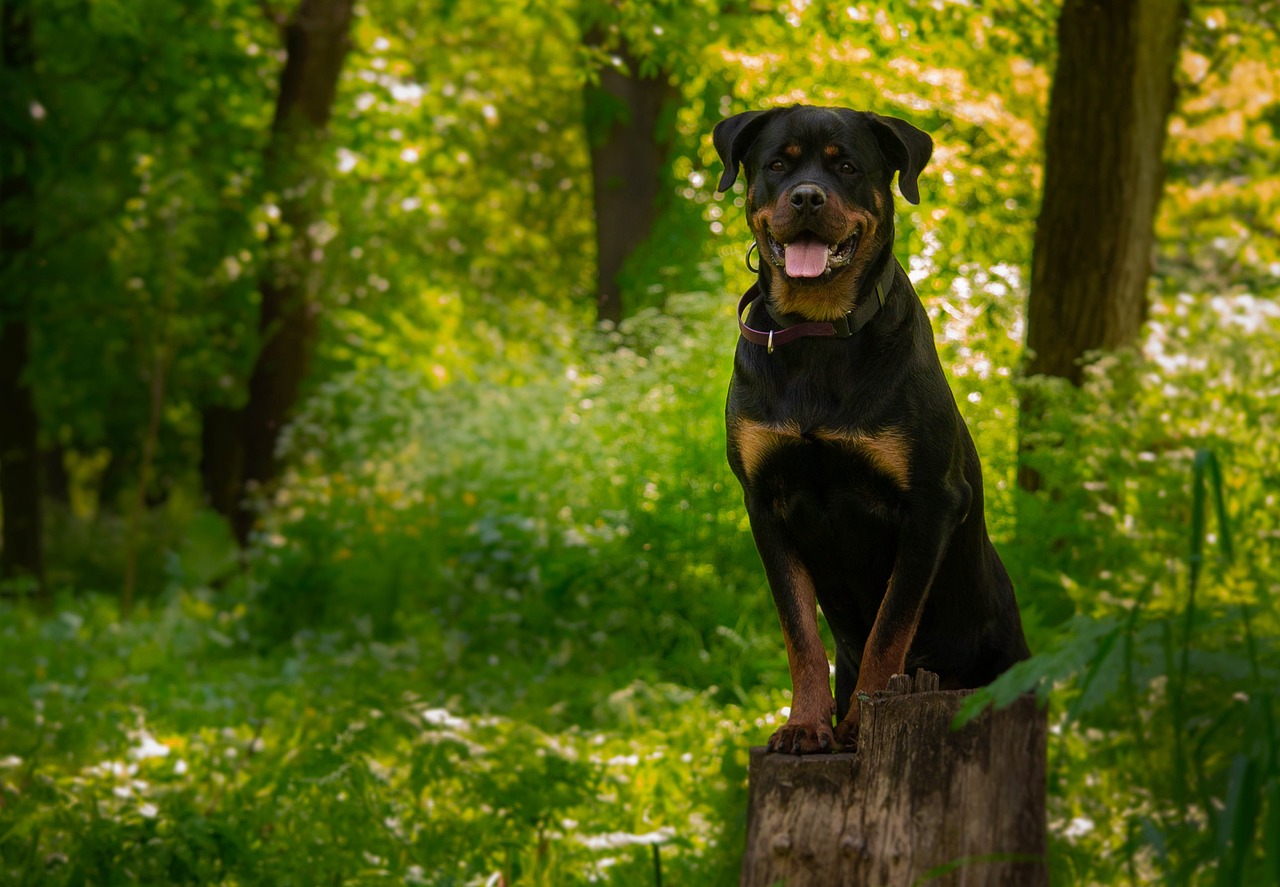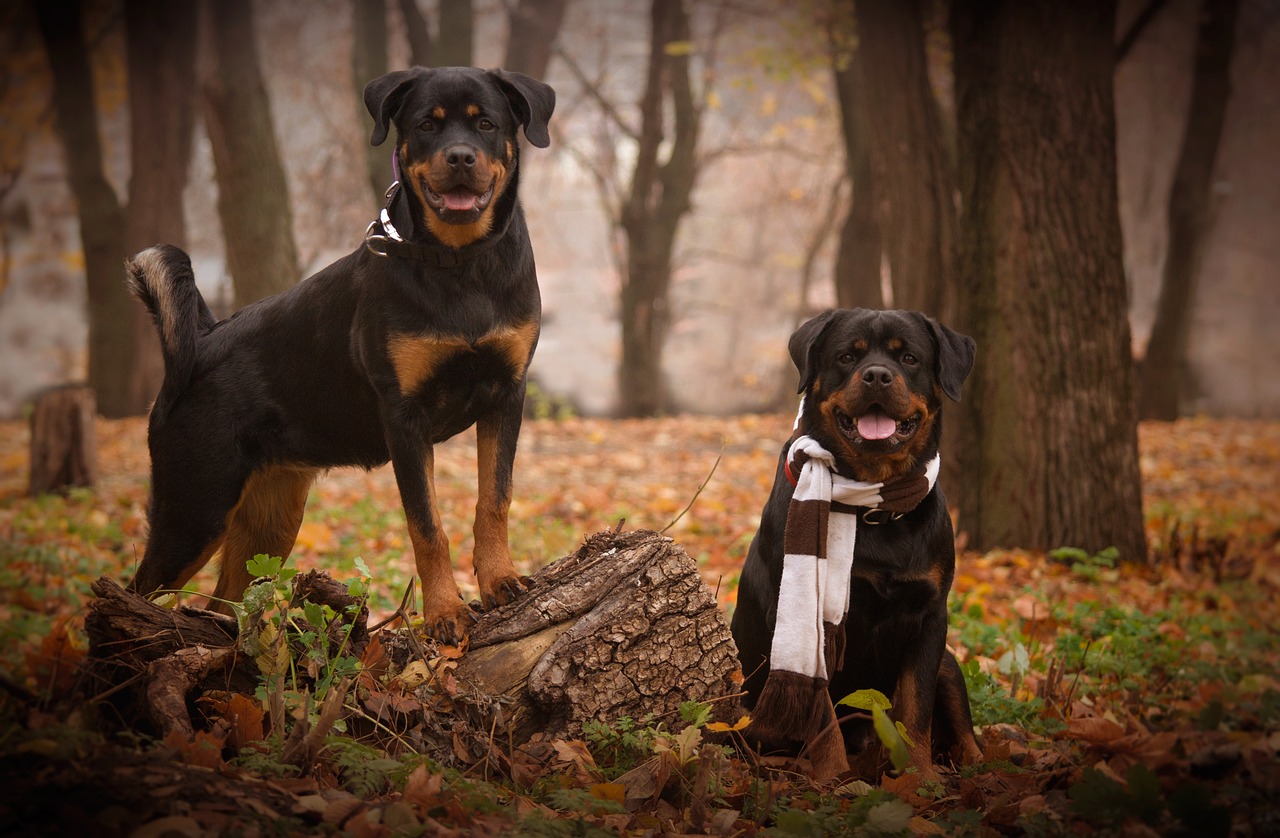The Rottweiler, a powerful and confident breed, is known for its loyalty and protective instincts.
This article delves into the history, physical characteristics, temperament, care needs, and health issues of the Rottweiler, offering valuable insights for dog lovers and prospective owners interested in this impressive breed.
Rottweiler : A Complete Guide to This Dog Breed
The Origins
The Rottweiler traces its origins back to ancient Rome, where it was used as a herding and guard dog. The ancestors of the Rottweiler accompanied Roman legions, driving cattle and protecting the soldiers. As the Romans expanded across Europe, these dogs were bred with local canines, giving rise to the Rottweiler we know today.
The breed takes its name from the town of Rottweil in Germany, where it was primarily used as a butcher’s dog. These dogs were employed to herd livestock and pull carts loaded with meat. They also protected their owners and goods, showcasing their strength and reliability. Rottweilers continued to serve in working roles, transitioning to police and military work as their abilities were recognized beyond herding.
The Physical Characteristics of the Rottweiler
Rottweilers are robust, medium to large-sized dogs. Males typically stand 24 to 27 inches (61 to 69 cm) tall at the shoulder, while females range from 22 to 25 inches (56 to 63 cm). Their weight varies, usually falling between 80 to 135 pounds (36 to 61 kg), depending on their build and sex.
This breed has a distinctive, short black coat with well-defined tan markings on the chest, legs, and face. Their muscular and compact build gives them an imposing and powerful appearance. The Rottweiler’s head is broad with a slightly rounded forehead, and they possess strong jaws and a confident, alert expression. Their ears are triangular and set high, lying flat against the head.
Compared to similar breeds, such as the Doberman Pinscher, Rottweilers are generally more muscular and heavier. While both breeds share a protective nature, the Rottweiler’s build makes it more suited for heavy-duty tasks.

The Temperament
Rottweilers are known for their loyalty, confidence, and protective instincts. They are devoted to their families and often form deep bonds with their owners. This breed is naturally watchful and alert, making it an excellent guard dog. While they can be reserved around strangers, proper training and socialization can help them differentiate between threats and friendly encounters.
With children, Rottweilers can be gentle and affectionate, but supervision is always recommended due to their size and strength. Early socialization is crucial for ensuring they are comfortable around young children and know how to behave appropriately. Rottweilers can also live harmoniously with other pets if introduced properly; however, their guarding instincts mean they may not immediately get along with unfamiliar animals.
In training, Rottweilers respond well to consistent and positive reinforcement methods. Their intelligence and eagerness to please make them quick learners, but they require a confident owner who can provide structure and leadership. This breed thrives in homes where they have clear boundaries and plenty of mental and physical stimulation.
The Care Needs of the Rottweiler
Coat Care: Rottweilers have a short, dense double coat that requires minimal grooming. Weekly brushing is sufficient to keep their coat healthy and manage shedding. During seasonal changes, they may shed more heavily, requiring more frequent brushing. Bathing should be done occasionally or when necessary, using a mild dog shampoo to protect their skin.
Exercise Requirements: Rottweilers are active dogs that need at least 1-2 hours of exercise daily. This can include walks, play sessions, and training activities. They enjoy mentally stimulating exercises, such as obedience training and puzzle games. While they can adapt to apartment living, access to a yard where they can move freely is ideal.
Hygiene and Health Care: Regular care for a Rottweiler’s ears, teeth, and nails is essential. Their ears should be checked for signs of infection and cleaned regularly. Dental care is also important, so brushing their teeth or providing dental chews can help maintain their oral health. Keeping their nails trimmed will prevent discomfort or injuries.
Health Issues Common
Rottweilers are generally a healthy breed but can be prone to specific health conditions. One of the most common issues is hip and elbow dysplasia, which can affect their mobility. They may also be susceptible to heart conditions, such as aortic stenosis, and certain cancers like osteosarcoma.
To ensure their well-being, Rottweilers should have regular veterinary check-ups and screenings for these conditions. The average lifespan of a Rottweiler is 8-10 years, but with proper care, some may live longer. A balanced diet and maintaining a healthy weight are crucial in minimizing health risks and ensuring a longer, healthier life.

Life Expectancy and Quality of Life for Rottweilers
The average lifespan of a Rottweiler ranges from 8-10 years. Factors such as genetics, diet, exercise, and healthcare practices can influence this duration. To maximize their quality of life, providing regular physical and mental stimulation is essential.
Activities like agility training, obedience courses, or simple games can keep them engaged and happy. Ensuring a balanced diet with high-quality food also contributes to their overall health and longevity.
The Pros and Cons of Owning a Rottweiler
Pros:
- Loyal and protective, making them excellent guard dogs
- Intelligent and trainable, capable of excelling in various roles
- Adaptable to different environments, including homes with or without yards
Cons:
- High energy levels require significant exercise and attention
- Strong-willed nature may not suit first-time dog owners
- Tendency to be aloof or suspicious of strangers if not properly socialized
What to Know Before Adopting
Rottweilers are best suited for owners who have experience with strong, confident breeds. They thrive in homes where they receive consistent training, exercise, and companionship. While they can adapt to various living situations, they do best in homes where they have access to outdoor space and where their energy levels are managed through regular activities.
Before adopting, potential owners should consider the time and commitment required to care for a Rottweiler. Consulting with breeders or rescue organizations can provide valuable information and help match the right dog with the right environment.
Rottweilers are a remarkable breed, known for their loyalty, intelligence, and strength. They can make exceptional companions for owners who are prepared to meet their needs and provide the guidance and attention they require. Proper research and preparation are crucial to ensure a successful and fulfilling experience for both the dog and its owner.








